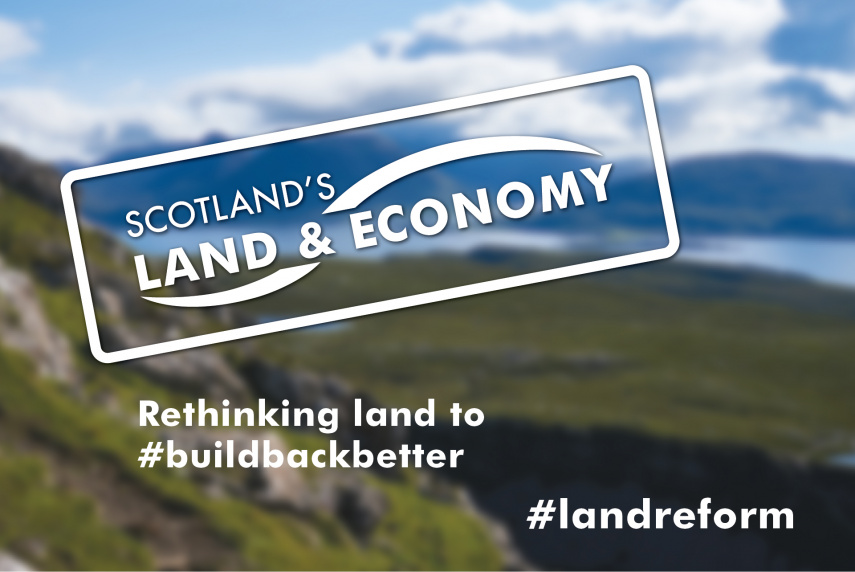
Rethinking land use for future generations
Jane Davidson

As part of the ‘Scotland’s Land & Economy’ series exploring the fundamental role of land in achieving Scotland’s post-pandemic recovery and renewal, we are publishing a range of guest blogs from leading thinkers across the UK. The purpose of these blogs is to stimulate ideas and debate and do not necessarily represent the view of the Commission.
Building on the recent blog ‘Land and collective wellbeing: fertile soil’ Jane Davidson, Chair of the Wales Inquiry of the UK wide Food, Farming and Countryside Commission, a smallholder and the author of #futuregen: Lessons from a Small Country, explores how we can rethink land use to look after the interests of future generations.
According to Kevin Cahill, who wrote a book called ‘Who Owns Britain and Ireland’, just 0.3% of the population – 160,000 families – own two thirds of Britain; i.e. less than 1% of the population owns 70% of the land, making Britain a front runner for the title of the country with the most unequal land distribution on Earth.
Even in Wales, we still see these effects, but at a smaller level. In 2018, HM Land Registry reported that although 85% of land in England and Wales has been registered, ‘much of the land owned by the Crown, the aristocracy and the Church has not been registered because it has never been sold – which is one of the main triggers for compulsory registration’.
This is an extraordinary story of systemic intergenerational unfairness – and for those of us striving to encourage governments to think longer term, to factor the wellbeing of future generations into all their decision making, a major challenge - but how much of a real obstacle is it to changing the mindset about land use?
Like many, hunkered down in my small rural community since the middle of March, battened down against the pandemic, I hankered for change; change from the existing farming patterns led by subsidy systems that have led to such dramatic biodiversity losses and nature degradation; change from the fast accelerating consequences of humans’ contribution towards climate change; change from the systems which reward the supermarket rather than the grower – and change to approaches that recognise the full cost and value of the essential underpinning of all species lives on this single planet of ours: food, water, shelter, energy.
And then came COVID and a global transformation took place – governments provided food to the needy, shelter to the homeless, and in the UK the ‘furlough’ scheme was a nod to those of us who would love to see a Universal Basic Income introduced, not least to facilitate citizen action on tackling the challenges ahead. We also saw challenges and local responses to food systems which hopefully will be here to stay. When the nation could not buy flour, the old water mills came into their own and secured not only additional provision but security of supply for communities on the edge like mine; security that has translated into a healthy business plan and new supply chain opportunities, including bringing more fields into wheat production. When we personally went down with COVID, our food and medicines were delivered to our door by businesses adapting to the new situation with new models. The speed with which these transformations have happened has been so quick, that it would be easy for a return to the ‘old normal’ but why should we? When the routes we were taking previously were hastening our own demise, why would we return to that? On the contrary, we should heed the recent words of Naomi Klein, ‘it just so happens that we are all alive at the last possible moment when changing course can mean saving lives at a truly unimaginable scale’
So, how do we change course to be part of the solution not the problem? We are helped in Wales by a new values framework, the Well-being of Future Generations (Wales) Act 2015 which came into force in 2016. The Act requires the Welsh Government and its public bodies to deliver on seven goals linked to the UN Sustainable Development Goals with explicit reference to climate change and enhancing biodiversity. The act redefines prosperity as ‘an innovative, productive and low carbon society which recognises the limits of the global environment’. In addition, the act contains five required ways of working: prevention, collaboration, long term thinking, integration (of objectives linked to goals) and involvement (of people in the decisions being made about them). Slowly and surely, this new values framework is changing behaviour – and importantly, can be enforced in the courts. There is a new Future Generations’ Commissioner to advise and support – who can name and shame when required. Audit processes and budget processes are changing because of the act and Wales has joined Scotland, Iceland and New Zealand in a joint aspiration to deliver wellbeing economics for people and planet.
What role does land use play in response to these existential challenges? Wales may have an exciting new law – but has little resilience, growing only 2% of its fruit and vegetable needs on 0.1% of our land. We may have 88% of our land in agriculture, but it turns out that our current agriculture practices in relation to cattle and sheep are problematic, with the UK Committee on Climate Change opining that where practice in Scotland would lead to net zero carbon emissions by 2045, in Wales it would be 2055.
How does management of land need to change, to become part of the solution, not part of the problem? Clearly a country that can feed its population is more resilient than one that cannot. What is the role of governments in ensuring sufficient land is made available to tackle food supply and nature degradation in their nation? What opportunities are there for regulations on public and private owners? It is interesting to note that of the ten largest landowners in the UK, the top five are the Forestry Commission, the Ministry of Defence, the Crown Estate, the National Trusts for England, Scotland and Wales and the RSPB. However, within the next fifteen, nine are private landowners – and all would be subject to government regulation in relation to land use.
But Government action is only one part of the equation. We also need to look at new models. How many public authorities want to manage all the land they own in these times of austerity? In November 2018 the Scottish Land Commission published a review into the effectiveness of community ownership mechanisms. One of the overarching recommendations of the review was to support the normalisation of community ownership. It found that many models across the world, shared similar characteristics: strong local governance, transparent decision making, clear democratic accountability, focus on local priorities, high levels of public engagement. I would share those views. In my book #futuregen: Lessons from a Small Country which describes the Welsh journey to the Wellbeing of Future Generations’ Act and civil society’s aspirations for it now, I describe two community land initiatives: One Planet Developments are regulated by the Welsh Government through the local planning system and enable successful applicants to build zero carbon homes in the open countryside, outside the usual planning requirements, provided they can demonstrate that within 5 years they can earn half an average income from the way in which they use their land. Lammas, the first planned eco-village in the UK uses this model and there are now successful applications in most counties in Wales; some individual and some in groups. Campaigners are looking to create more peri-urban opportunities which seems an exciting next step. The other initiative is ‘Skyline’, an exciting proposal under active consideration now to hand the land around three south Wales ex-mining valleys’ towns to their communities in perpetuity provided the initiatives they undertake on the land accord with the Well-being of Future Generations (Wales) Act. Think of the opportunity here for community ownership to transform local opportunities within a specified values framework.
As the Chair of the Wales Inquiry of the Food, Farming and Countryside Commission, we launched our Wales report, the Wales Field Guide for Future Generations, last month – virtually at the Wales #Green Recovery Festival - and as part of that launch held a focused land use event, featuring both One Planet Developments and Skyline. Also at the festival was a celebration of WWF Cymru’s work on creating ‘A Welsh Food System Fit for Future Generations’. The response has been tremendous, with a real interest, not just in those models but others too.
It is time to think big, to think what if? What if every community council had at least one Community Supported Agriculture scheme, since we know that box schemes have waiting lists wherever they operate? What opportunities could there be for a new agro-ecological subsidy system post BREXIT to convert some of our agricultural land in Wales to new pilot models for forestry, nature-restoration as well as food production, thus creating new food opportunities and bringing down emissions? What opportunities are there for renting land for new uses with so much land in rural Wales no longer being farmed by its owners? What regulations need to be in place to deliver – and can governments be brave enough? What new opportunities will public services take as they are obliged to deliver according to the Wellbeing of Future Generations Act?
I’m excited. I feel we are at a turning point. The Scottish Land Commission review commented ‘How land is owned, used, and managed is a product of prevailing cultural circumstances. It is neither natural, inevitable, nor fixed – so if cultural expectations change, then so can the models we use to deliver these expectations’ We may not turn around centuries of land management overnight but with different land use, we could definitely look after the interests of future generations. A collaborative approach between government and the people needs to start now. I hope that in our Wales Inquiry, when we test all these ideas and more, there will be good practice from Scotland that can feed into our thinking and jointly we can highlight ideas that will benefit future generations in our nations. There is no better time to test the water with new propositions than next year’s elections in the devolved nations.
Jane Davidson is Chair of the Wales Inquiry of the UK wide Food, Farming and Countryside Commission, a smallholder and the author of #futuregen: Lessons from a Small Country, the story of why Wales was the first country in the world to introduce legislation to protect future generations. Contact her at https://www.janedavidson.wales
This article reflects her personal views, rather than the Food, Farming and Countryside Commission’s views